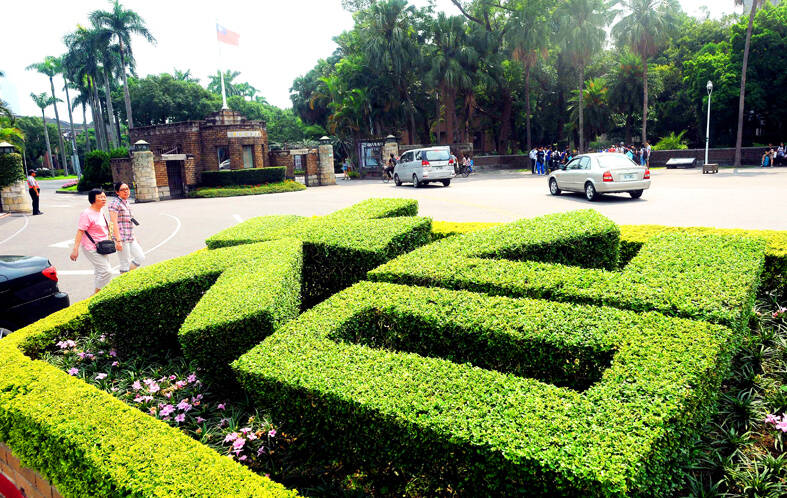The new academic calendar released yesterday by the Taiwan University System, a consortium of three universities headed by the National Taiwan University (NTU), followed the growing trend of shorter university semesters.
The Taiwan University System, which also includes National Taiwan Normal University and National Taiwan University of Science and Technology, first tested the 16-week semester, which deviated from the then-common 18-week semester, in 2022.
For the new academic year that is to start in September, the consortium is to begin winter vacation two days earlier than last year.

Photo: Lin Cheng-kung, Taipei Times
Meanwhile, academic institutions including National Tsing Hua University and National Yang Ming Chiao Tung University have said that they are considering following suit to have 16-week semesters.
Citing the Enforcement Rules of the University Act (大學法施行細則), the Ministry of Education said one university credit is defined as one credit per 18 hours of classes, and all lab and intern courses are defined as one credit per 36 hours and 54 hours respectively.
All members of the Taiwan University System still adhere to this definition — which ensures that all courses can be concluded within 16 weeks — despite their flexible semester schedules, the ministry said.
Also citing the University Act (大學法), the ministry said universities are obligated to report when adjusting the duration of semesters, as it affects students’ learning rights.
Schools should make applications to the ministry from Jan. 1 to Feb. 15 or from May 1 to June 15, if they wish to make adjustments to the number of weeks in a semester, it said.
Commenting on NTU’s intent to designate summer semesters an official semester, the ministry said that such a plan was “not recommended” in its April 13 meeting in 2022.
At the time it advised against having a third semester, citing controversial admission fees and other issues, the ministry said.
Universities are already allowed to schedule certain courses over the summer and they should take advantage of such policies, it added.

TRAGEDY: An expert said that the incident was uncommon as the chance of a ground crew member being sucked into an IDF engine was ‘minuscule’ A master sergeant yesterday morning died after she was sucked into an engine during a routine inspection of a fighter jet at an air base in Taichung, the Air Force Command Headquarters said. The officer, surnamed Hu (胡), was conducting final landing checks at Ching Chuan Kang (清泉崗) Air Base when she was pulled into the jet’s engine for unknown reasons, the air force said in a news release. She was transported to a hospital for emergency treatment, but could not be revived, it said. The air force expressed its deepest sympathies over the incident, and vowed to work with authorities as they

A tourist who was struck and injured by a train in a scenic area of New Taipei City’s Pingsi District (平溪) on Monday might be fined for trespassing on the tracks, the Railway Police Bureau said yesterday. The New Taipei City Fire Department said it received a call at 4:37pm on Monday about an incident in Shifen (十分), a tourist destination on the Pingsi Railway Line. After arriving on the scene, paramedics treated a woman in her 30s for a 3cm to 5cm laceration on her head, the department said. She was taken to a hospital in Keelung, it said. Surveillance footage from a

Police have issued warnings against traveling to Cambodia or Thailand when others have paid for the travel fare in light of increasing cases of teenagers, middle-aged and elderly people being tricked into traveling to these countries and then being held for ransom. Recounting their ordeal, one victim on Monday said she was asked by a friend to visit Thailand and help set up a bank account there, for which they would be paid NT$70,000 to NT$100,000 (US$2,136 to US$3,051). The victim said she had not found it strange that her friend was not coming along on the trip, adding that when she

INFRASTRUCTURE: Work on the second segment, from Kaohsiung to Pingtung, is expected to begin in 2028 and be completed by 2039, the railway bureau said Planned high-speed rail (HSR) extensions would blanket Taiwan proper in four 90-minute commute blocs to facilitate regional economic and livelihood integration, Railway Bureau Deputy Director-General Yang Cheng-chun (楊正君) said in an interview published yesterday. A project to extend the high-speed rail from Zuoying Station in Kaohsiung to Pingtung County’s Lioukuaicuo Township (六塊厝) is the first part of the bureau’s greater plan to expand rail coverage, he told the Liberty Times (sister paper of the Taipei Times). The bureau’s long-term plan is to build a loop to circle Taiwan proper that would consist of four sections running from Taipei to Hualien, Hualien to